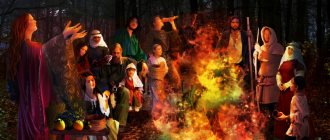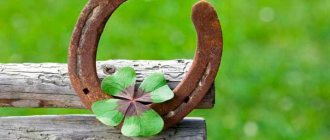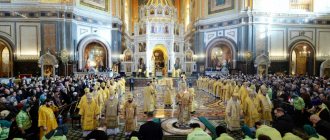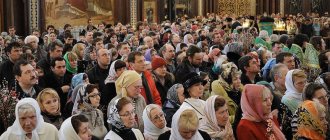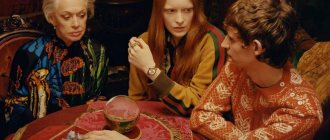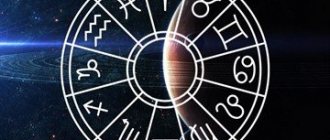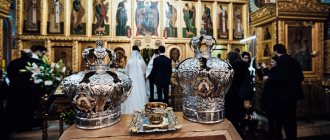Prologue, or When people “quarreled” with animals?
After the creation of the world, God entrusted man with a special mission - to be the king of nature. This is how the Book of Genesis tells about it: “And God blessed them, and God said to them: Be fruitful and multiply, and fill the earth, and subdue it, and have dominion over the fish of the sea and over the birds of the air, and over every living thing that moves on the earth.” . But this did not mean at all that a person could now dispose of everything alive as he wanted. I want - I cultivate, I want - I tear out and kill.
No, before the fall of man there was harmony in the world. Man considered animals to be lesser brothers; they, accordingly, were not afraid of Adam and Eve. In addition, the first people ate exclusively plants, so there was no question of danger to animals. This was the meaning of the expression to be the “king of nature” - that is, to take care of it, to maintain harmony in everything that God created.
When man fell away from God, the unity of the world was disrupted. Man no longer ate fruits from God’s hands, but by the sweat of his brow he tilled the land and grew bread. Now he had to fight the weeds. The body of Adam and Eve, expelled from paradise, was covered with “leather vestments.” It is assumed that these were animal skins.
Since that time, the relationship between man and the animal world has been disrupted. We are talking about wild animals, predators, the news feed is replete with headlines about those who died a “brazen death,” torn to pieces by animals. All this testifies to the depth of the fault that our ancestors laid.
Against the backdrop of all this, the stories about some saints who were friends with wild animals seem surprising. In addition, in the lives of the martyrs you can read about how they were thrown to be torn to pieces, but the animals behaved like obedient pets.
We offer you several such stories.
What will happen to people who are cruel to animals?
Photo: Flickr.com
Man is often not a protector, but an executioner for all life on Earth. It’s one thing when livestock is killed for its skin, meat, and leather. It’s another matter when animals are killed during a hunt simply for sport. Or they catch fish as a competition and then throw them away. The patristic opinion on this matter is clear - such people are not true Christians. And such a thing is a sin aimed at destroying the world created by the Lord.
The Holy Scripture says:
“You love everything that exists, and you disdain nothing that you have made” (Wis 11:25).
That is, the Lord loves animals, but man considers them just a toy in his hands? Is this opinion too arrogant? Isn't this pride? Exactly! And punishment for mortal sin will be inevitable. No one knows what the Lord will take away in response to the taking of the life of an innocent animal. No one can imagine what kind of punishment a person will suffer if he beats his dog or abandons a cat that has become unnecessary to the mercy of fate. Will the cat's owner also be abandoned by his children? It is not given to us to know, but it is certainly worth thinking about.
It is not for nothing that many Orthodox saints were kind to animals and never allowed cruelty towards God’s creatures.
Saint blessing wild animals
Hieromartyr Blasius was the Bishop of Sebastia and lived in the 4th century. This was the time of the ruler Diocletian and terrible persecution of Christians.
Therefore, Vlasiy found shelter in a remote cave in the desert. People came to him very rarely, but animals came to him constantly. In addition, they meekly waited for the Bishop of Sebaste to pray and bless them.
The emperor's servants found Saint Blaise and took him to the city for execution. Along the way he healed people and animals. One widow tearfully told the story that the wolf had taken the last pig, so she would have nothing to feed herself. The bishop sincerely prayed that the wolf would return what he had stolen. And so it happened.
In Orthodox iconography, Blaise of Sebastia is depicted together with the animals that came to him for a blessing.
Animals in the Bible
When leaving Egypt, dogs and cats were considered unclean creatures; comparison with a dog in Jewish society was considered the height of insult. During the time of King David, dogs guarded the herds; cattle breeders could not get by with their four-legged helpers.
In the New Testament, when meeting with a Canaanite woman, Jesus initially refused her request to save her daughter, to which she replied that even dogs eat from their owners’ tables. This can be taken to mean that dogs already lived in houses (Matthew 15:27).
Jesus' meeting with the Canaanite woman
The apostle Paul expressed his disdain for dogs when speaking about sin, comparing a sinner to a dog that returns to its vomit (2 Peter 2:22).
Historical messages from the fifth century contain information that the cruel Attila, the leader of the Huns, was born after the copulation of a woman with a dog.
Jesus emphasized more than once during His earthly life that there is no comparison between people and animals, birds and plants. It is man who has value in the eyes of the Creator. However, the Church does not say anything about whether animals can be kept in the house.
Saint Gerasim and his faithful friend the lion
According to legend, a lion came to Gerasim of Jordan, who lived in the 5th century and led a hermit’s life. He raised his paw, damaged by the thorn, high. Saint Gerasim took out thorns, cleaned the already festering wound and bandaged it with a handkerchief. In gratitude for the help, the lion remained forever near Gerasim, accompanying him in everything. He remembered his voice, knew his desires and served faithfully.
When the holy hermit passed into another world, the lion came to his grave and after a short time also died. Saint Gerasimos of Jordan is depicted in icons like this - together with his faithful friend.
Cosma, Damian and the camel
Burial of Saints Cosmas and Damian. Artist Fra Angelico. 1438—1440
The holy healing brothers Cosmas and Damian of Assia lived in Asia Minor around the 4th century AD. They healed not only people, but also animals. They walked through houses, forests and deserts, found sick animals and helped them. Grateful animals followed the healers in whole herds.
One day Cosmas and Damian met a barely alive camel in the desert. The saints took pity on him, healed him and released him. Many years later, the camel repaid the brothers with gratitude. Cosmas and Damian vowed never to take payment from anyone for their work, but at the end of his life Damian was forced to break his vow - he took three eggs from a healed woman in the name of the Holy Trinity. Cosmas was very upset when he learned about his brother’s act, and even made a will in which he forbade burying him and his brother together after death. But that same night the Lord appeared to Cosmas: “Why are you grieving for the sake of the three eggs you took? They were taken not for the sake of a bribe, but for the sake of the wife’s oath in My name...” Cosmas was comforted, but did not tell anyone about his vision. After some time, Saint Cosmas rested in peace. After some time, Damian also died. People who honored their memory did not know what to do with Damian’s body, where to put it, so as not to break the will. And suddenly a camel came up to them - the same one that the holy brothers had once healed - and spoke in a human voice! The camel told everyone the secret of Cosma. The brothers were buried together.
Saint Neophytos “rents an apartment”… from a lion
The martyr Neophytos lived during the first centuries of the persecution of Christians. He decided to become a follower of the Savior, so he went to the mountains for retreat. In the cave where he decided to settle, there lived a lion. The saint calmly turned to the predator and asked him to leave his new home. The animal obediently left the cave.
When the pagans decided to torture Neophyte, they threw him into the Colosseum with wild bears. But the animals obediently bowed their heads before the saint. Then the tormentors decided to set a hungry lion on the saint. But he, like an obedient pet, approached Neophyte and licked his feet. According to legend, this was the same “friend” who at one time lent “housing”. Saint Neophytos turned to the lion and said that he could calmly return to his “apartment,” because the martyr clearly no longer needed it. The predator escaped from the circus arena and ran into a cave, and Neophyte had to be executed by people since the animals refused to do so.
Macarius and the hyena
Macarius of Alexandria and the hyena
The Monk Macarius of Alexandria, who lived in the 4th century AD, was distinguished by his asceticism and extreme demands on himself. One day he killed an annoying mosquito on his leg and immediately began to reproach himself. The saint was tormented by remorse until he took revenge on himself by submitting his body to the bites of a countless horde of mosquitoes.
Another time, a hyena came running to the monk and brought her blind puppy in her teeth. The saint picked up the cub, spat in its eyes, prayed to God and the puppy received his sight. The hyena, having taken the baby, ran away, and returned in the morning, bringing a huge lamb skin. Macarius became angry: “Where did you get this skin from? Have you eaten someone's sheep? If you got it by violence, I won’t take it!” The hyena bowed its head, knelt down, and laid the skin at the feet of the saint. But he agreed to take the hyena’s gift only after he secured her “consent” not to offend the poorer people by eating their sheep.
Bread for the bear
Many Orthodox Christians are familiar with the icon “Reverend Seraphim Feeding a Bear with Bread.” One nun was approaching the Sarov saint and saw a bear near him. With the words “My death!” and fell to the ground.
When she woke up, the Monk Seraphim asked her not to be afraid and called the animal to him. The huge bear quietly lay down at the feet of the saint, and Seraphimushka began to feed him bread; through the prayers of the saint, the calmed nun also joined in.
Another respected saint, St. Sergius of Radonezh, also fed the bear. It all started with the fact that a hungry animal came to the saint, having received a treat, it visited Sergius every day.
Why don't dogs go to church?
And finally, we come to the most pressing topic for dog breeders: why shouldn’t dogs be allowed into the temple? And who established this? We need to start with the fact that no animals are allowed to enter the temple at all. This is stated in canon 88 of the Sixth Ecumenical Council :
No one introduces any animal into the sacred temple... If anyone is seen, according to the above, unnecessarily introducing an animal into the temple: then the cleric will be deposed, and the layman will be excommunicated.
An extreme case can only be a danger to human life. In addition, the Russian Orthodox Church has a decree that specifically prohibits dogs from being allowed into the church. This is motivated by various reasons: noisy behavior, uncleanliness, the possibility of desecration of the throne. There's nothing personal here.
Why are cats then sometimes allowed to be in the temple? How are they better than dogs? Firstly, this is done only in very rare cases, for example, when the temple is infested with mice. Mice are a threat to the temple, to the altar, and in this case, a cat is indispensable in a rural temple, for example.
Secondly, dogs are initially considered yard animals, and cats are considered domestic animals. In a word, the issue of grooming and cleanliness of the animal is of leading importance here. And cats are quieter. However, in the charter of the Church there is no special procedure, no prayers for the re-consecration of the temple in the event that some dog accidentally entered there.
Belted with a snake
We do not know the name of this ascetic, but at least the fact that Paisius the Svyatogorets told this story does not allow us to doubt his existence.
One elder spent his life in work and prayer. But in the area where he lived there were many snakes. They were not afraid of the monk, they often approached him, and sometimes even interfered with his work. One of them was particularly annoying. The elder could not stand it: he grabbed it and tied it like a belt. One monk brought him food and was very frightened by what he saw. To this, the elder simply assured that there is no need to be afraid: “Christ said that he gives us the power to step on snakes, and scorpions, and all the power of the enemy, and nothing will harm us.”
What animals were considered unclean?
On what principle was the division carried out? What criteria “elevated” some animals and “degraded” others? In Leviticus it is said that any animal that has cloven hooves and a deep cut in the hooves and chews the cud is suitable for human food; of all the winged reptiles that walk on four legs, eat only those that have shins above the feet. to jump on the ground with them.
Of fish - those that have feathers and scales in the water. Of the birds, only the “bad” ones are listed. All four-legged animals “that walk on their paws” turned out to be unclean animals. As you can see, not only dogs, but also cats fall into this category.
What is the reason for this interesting division of God's creation? In addition to the argument already given regarding the Egyptian cult, there is also an allegorical understanding of these criteria. According to him, for example, cloven hooves “should remind of the good and evil consequences that can arise from any action” and so on. All those crawling on the ground and feeding on carrion obviously cannot be clean either.
Interestingly, recent scientific research confirms the wisdom of the Old Testament division of creatures into those suitable and unsuitable for food. Most of those called unclean animals in the Bible are carriers of many diseases and infections.
Begged friend
Saints Eutyches and Florentius labored in the desert. But then Eutychius was chosen as abbot of the monastery, so Florentius was left alone in the desert. He was supposed to guard their temple. Florenty asked the Lord to send him a comrade. God heard the prayers and sent... a bear. He stood in front of the temple with his head bowed, saying, “I came to serve you.”
From Florence he received a job - herding five sheep. In addition, there was also its own discipline: the bear knew on what days, for how long it needed to graze, and when to eat. On fast days he fasted with Florentius. And I never violated such a “charter”. People found out about this, and several monks, out of envy, killed Florentine’s friend. All four received punishment for this - death from leprosy.
David of Gareji with deer
This saint lived in the 6th century. At first he labored in Tiflis, and then he suffered from evil tongues and went into the desert together with his disciple Lucian. When the disciple began to feel sad from the lack of food and water, the saint tried to explain to him the action of God’s providence. At that moment, a female deer with small fawns ran up to him. Fulfilling the saint's obedience, Lucian milked the animals. And the faith and prayer of David of Gareji helped turn it into cheese.
People hunted for these deer, but the animals fled to St. David's cave to hide. Once inside, the hunters were very surprised, because the wild deer behaved like domestic animals.
Where do animals go after death?
Do animals go to heaven? Since animals do not have an afterlife, this question becomes meaningless. Prayers for deceased pets are also meaningless. You can only pray for living pets, for example, for their recovery from illness. However, a believer may have a question: will animals exist with man in Eternal Life after the Second Coming of Christ? We don’t know this, and the Holy Fathers answered this question differently.
The Apostle Paul wrote: “For we know that the whole creation groans and suffers together until now; and not only [she], but we ourselves, having the firstfruits of the Spirit, and we groan within ourselves, awaiting adoption as sons, the redemption of our body. For we are saved by hope” (Rom 8:22–24).
Who did the apostle mean by “creature”: only the human race or all living creatures? St. Augustine believed that only man. And Saint Simeon the New Theologian saw in the words of the apostle an indication of the renewal of the entire living world (“Word forty-fifth”).
Also, if animals were in Eden, then why shouldn’t they be in the new paradise, on the renewed Earth? Let us remember the words of the prophet Isaiah about the future Kingdom of Heaven without evil and cruelty. There the wolf and the lamb, the cow and the bear will live peacefully together (Isa. 11:6), and the baby will play near the asp's hole and the snake's nest (Isa. 11:8). These words can be interpreted both figuratively (absolute absence of evil) and literally (animals will return to their pristine heavenly state). Archpriest Maxim Kozlov in his “Children's Catechism” expresses the idea that in the Kingdom of Heaven animals will be transformed, with their best qualities. Archpriest Andrei Tkachev, answering a question about the existence of animals in the Kingdom of Heaven, says:
“When it’s good for us [in Paradise], then it will be good for everyone there: birds, fish and other animals.”
Saint Theophilus of Kyiv and the obstinate bull
A certain butcher Ivan Katkov told the saint about his acquisition - an obstinate bull that had already crippled many. What to do? And it’s impossible to hold, and it’s a pity to kill.
Theophilus says:
- And you give it to me!
- But what if it’s difficult to get close to him? - Ivan asked.
- Just. Come up and say: “Hey, bull! From now on you are not mine, but Father Theophilus’s. Get ready to visit him..."
That's what Ivan did. And lo and behold, the snorting animal became obedient and soft.
Blessed Theophilus made himself a cart, a small booth and harnessed a bullock. He had no reins; the saint generally turned his back and on his knees read the Psalter on his knees. But the animal sensed its owner and drove around pits and hillocks. Moreover, the bull knew exactly where to take the saint, although he did not say anything.
Comparing with other religions
It must be said that in different religions, God’s creations, in particular dogs, are treated and treated differently. For example, in ancient Zoroastrianism she was revered immediately in second place after man. They even brought food to the animals, which was intended for the souls of the dead.
But in Islam , a dog, on the contrary, is an unclean animal, which is called “najasa”, that is, “dirty”, because it cleans itself with its tongue. Having touched it, a Muslim must perform a complete ablution. The Jews never favor these animals, although they may keep them at home as guards.
Among Buddhists , who firmly believe in the transmigration of souls, dogs are revered above cats in the rank of rebirth. However, this only applies to purebred individuals. And finally, Catholics, unlike us, allow their four-legged animals to enter the church (it is not clear, however, why). They even have their own saint - Francis of Assisi.
Priest Nikolai Karov talks about why animals are not allowed into the temple:
Epilogue, or Return to Unity
This is just a small part of the stories of how wild animals became friends of saints. If you look at God’s plan for the world, analyze the changes after the fall of Adam and Eve, it becomes clear: God created harmony in which man and the animal world lived in harmony.
Terrible hostility and violence spring from the depravity of this world. This certainly wasn’t the case in heaven. And the saints found this harmony. Therefore, the animals next to them became the way they were created. They served man, and he, in turn, took care of them. In the words of Exupery, “We are responsible for those we have tamed,” it turns out there is even more depth than it seems at first glance.
PORTAL CONTACTS
Let's talk about the attitude of the Christian religion towards animals. The fact is that we have a lot of people who are not indifferent to our “little brothers”. You can often see compassionate men and women carrying bowls of stew for homeless puppies or kittens in the morning. Most of these people believe in God, in the atoning sacrifice of Christ and live according to His commandments, but do not accept the teachings of the Church precisely because, in their opinion, it rejects the value of animals in the universe and generally considers them not worthy of human attention.
This is far from true.
First of all, I note that the teaching of the Orthodox Church about animals does not exist. There are only private opinions of the Holy Fathers on this matter, which, however, were not approved as a dogma by the Church itself. Therefore, we will consider the private opinions of Christian ascetics[1]. There are two important aspects to this issue. First: are the souls of animals immortal and will they inherit the Heavenly Kingdom; and second: about the attitude of God and people towards them.
Supporters of the statement that the soul of an animal disintegrates at the moment of its physical death (in particular, St. Ignatius Brianchaninov) say the following: everything that does not have in itself the “image and likeness of God” will not inherit the Kingdom of Heaven.
However, there is a reasoned objection to this statement. Namely: in the primordial paradise, animals existed (from the Holy Scriptures it is known that Adam gave them names (Genesis 2:19–20), and they were created long before the birth of man. And everything created before the fall of people, as is known, was incorruptible! Consequently, animals were also immortal. So why in the former paradise were living beings that are not “the image and likeness of God”, and incorruptible, but in the future paradise they should not be? Attempts to explain this by saying that , animals were initially needed to help people in everyday life - are absolutely groundless for the simple reason that Adam and Eve in paradise did not need anything: neither to protect their home, nor to exterminate mice, nor to plow the land. Among the products allowed for their food, according to the Holy Scriptures, meat did not appear in any way.
And now let us turn to the arguments of those holy Fathers who held a different point of view on this issue (and there are many more of them than the supporters of St. Ignatius). In particular, the holy Archbishop Luke of Voino-Yasenetsky quotes from Holy Scripture to prove the correctness of his views: I will pour out My Spirit on all flesh (Joel 2:28); Your incorruptible spirit abides in everything (Wis. 12:1). From this, Archbishop Luke concludes that “the spirit of animals <...> cannot be mortal, for it too is from the Holy Spirit” (incorruptible - V.K.)[2].
Next, he quotes remarkable lines from the Epistle to the Romans of the Holy Apostle Paul: The creation waits with hope for the revelation of the sons of God, because the creation was subjected to vanity, not voluntarily, but by the will of him who subjected it, in the hope that the creation itself will be freed from slavery to corruption (Rom 8 :19–22).
Commenting on these lines, St. Luke writes: “The whole creation would have lived in light and joy if Adam’s fall had not changed the fate of the world <...> and in the sad fates of life, she, by the sinful will of Adam, to whom God subjected her, fell into vanity, disorder and suffering”[3]. From this, many priests conclude that we owe an unpaid debt to animals. Animals, birds and all of God's creation received sickly and mortal bodies because of the sinful actions of the first people! Unlike them, animals were not guilty of anything before God!
What will happen to God's creation next? And then, on the new, renewed Earth, according to the Holy Scriptures, the wolf and the lamb will graze together; and the lion shall eat straw like the ox (Isaiah 65:25). That is, predators, this creation of the devil (who changed a lot on the Earth entrusted to him at his own discretion), will again become meek herbivorous creatures, as they were intended by God. Moreover, according to the creator of the “Children’s Catechism”, Archpriest Maxim Kozlov, animals in the Heavenly Abode will not be the same as they were on Earth, but “transformed”, “including some better” that can be taken from them[4] .
According to the words of Saint Luke, “immortality for a creature will not have the same meaning as for a person. Its primitive spirit cannot endlessly develop and improve morally. Eternal life for a low creature will be only a quiet joy in enjoying the luminous nature and in communication with a person who will no longer torment and destroy it”[5].
Namely: “he will not torment and destroy...”. Unfortunately, the sinful nature of modern man is such that he often becomes the executioner of all life on Earth. He sees in animals and birds not a soul, but exclusively meat and skin. But that's not so bad. He often kills animals while hunting and fishing, not for food, but for the purpose of entertainment! A person who does such a thing, who feels pleasure at the sight of the suffering of God’s creation, does not have a drop of Christian in him! And if he considers himself a believer, then this faith of his is absolutely and fundamentally incompatible with Christianity.
Supporters of killing animals and people who are absolutely indifferent to them say this: these are “unreasonable” creatures, they have no “spiritual value.” I will answer with a quote from the Holy Scripture: You love everything that exists, and you do not disdain anything that you have created (Wis. 11:25). That is, God loves all creatures He created. And therefore, none of the people has the right to exalt themselves above the rest of the Lord’s creation - especially since the mind and spirit, which we so love to be proud of, are not at all the fruits of our labors and efforts, but exclusively a gift from the Almighty!
What should be the attitude of Christians towards animals is best illustrated by the example of Orthodox saints. The Venerable Seraphim of Sarov set up a real dining room for forest animals near his dugout. Hares, foxes, squirrels and even a bear came to him. Not only could it not have occurred to Father Seraphim to point a gun at them, but he was not indifferent to their troubles and never denied them bread.
Through the prayer of St. Sergius of Radonezh, a blind bear cub, which was brought to his hut by a bear, was healed.
Elder Gerasim of Jordan removed a thorn from a lion's paw. After this, the beast humbly worked with the saint all his life and died at his grave...
Many Athonite elders talked to animals as if they were people. Even spiders and snakes were revered.
Of course, the attitude towards animals cannot be taken to the level of worshiping them. It is unacceptable, say, to spend a lot of money on all kinds of haircuts and manicures for your pets, to buy them expensive clothes, etc. It is not good to seat them at the table with people as family members. Animals must take their rightful place among people, and Orthodoxy points to this. But if such a tendency is inherent mainly in Western countries, then Russia in this sense is characterized by the exact opposite phenomenon, namely: we treat our “little brothers” as an inanimate thing. For example, parents often take a puppy or kitten for their son or daughter as a living toy. And when they see that their child no longer plays with him, they throw the little animal out into the street, dooming the four-legged baby to suffering and starvation. You can’t do this, it’s not divine. If a Christian takes an animal into his home, he is obliged to care for it - feed, treat, etc. - until the end of its life (in exceptional cases - for example, when an animal causes allergies in a child - it is necessary to find other owners for the four-legged pet or give him to a shelter).
And in this regard, I would like to especially say about the attitude towards homeless animals.
Have you ever seen “basement” kittens and puppies? No? Then listen to the eyewitness: skinny as skeletons, with fallen hair and festering wounds, they sit, huddled in a ball, among heaps of droppings or in fetid slurry - downtrodden, frightened and helpless... And some of them (apparently, having managed to experience the comfort of home), Having noticed a person, they begin to squeak pitifully, trying with all their might to crawl up to him. And in their gaze you can clearly read: “Where have you gone, big brother? Help. We feel very bad!..” And if the hungry but healthy can still be fed a little, then in the case of the sick and crippled there is only one thing left to do: cry with them and pray to God that He will quickly end the suffering of these four-legged babies. Because you can't help them! The law of corruption and death on Earth is immutable (I repeat, due to the fall of the first people).
But if there is an opportunity to help the unfortunate poor fellows, then a Christian is obliged to do this. It is not permissible for believers in Christ to pass by a hungry kitten or a puppy hit by a car, but still alive!
Charity is an integral part of our faith. A person with a heart of stone, by definition, cannot enter the Heavenly Abode, and compassion is not selective. You cannot love people and at the same time despise the rest of God's creation. Otherwise, such “mercy” is false; and in this case, a person should honestly answer the question: is there Love in him at all? Or is he just pretending that he is capable of love?
...Recently, in one of the brochures with stories about the pilgrims of Diveyevo, I saw a photograph in which a man was captured, and pigeons were calmly sitting on his shoulders and outstretched arms, preening their feathers. Looking at the picture, I thought: this is probably a symbol of paradise, where Love reigns between all of God’s creation, the unified brotherhood of all living things - people, animals, birds, butterflies, insects. For we are all, albeit to different degrees (some are “elder brother”, and some are “younger”), but children of one Heavenly Father.
[1] For more details, see: On attitude towards animals. M., 1998. - Ed.
[2] Saint Luke (Voino-Yasenetsky). Spirit, soul and body. M.-Klin, 2003. P.125.
[3]Ibid. pp. 125–126.
[4] Archpriest Maxim Kozlov. Children's Catechism. 200 children's questions and non-childish answers about faith, the Church and Christian life. M., 2001. P. 34.
[5]Saint Luke (Voino-Yasenetsky). Spirit, soul and body. P.126.
V.Kuzin
Magazine "Alpha and Omega" No. 1 (51), 2008
